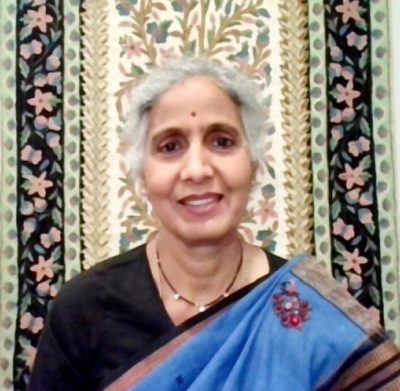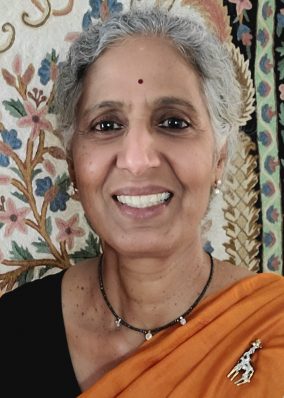
Carnatic Compositions – The Essence and Embodiment
– Aparna Munukutla Gunupudi
Our intent for this essay is to highlight the great features of the language, emotion and melody (rAgam) of a krithi (song/composition) and also to provide the song for your listening pleasure. Most of you may know these krithis, but when you discover the distinct features of a krithi, you may enjoy a new beauty or an attribute in the krithi.
Note: Krithi is defined as a song containing pallavi, anupallavi and charanam that have high musical value and can be sung elaborately with improvisations. Whereas, Keerthana also has a pallavi, anupallavi and charanam but is sung in a single form or simpler pattern.
Andamuga Ee Kadha Vinave
Raga – Kaanada
Thalam – Adi
Composer – Munipalle Subrahmanya Kavi
Language: Telugu
Pallavi:
andamugA Ee katha vinavE rajatachala sadanA
parihasita vininditaravinda chandra vadanA
Kunda brunda sundara radanA
Anupallavi
mandayAna dasaratha vasudhesuDu
mAnyayasudayodhyakAntuDu
Pondaga tanayulu lenanduku vagachendi
vasishTuni jeri palke sAnandamugA
charaNam 1
Manavini vinumu swAmInAkika srImantulaisutulu
Everavuna janiyinchedarAtmaja hInunaku
Dhanambu sukhakarambu gAdukadA
Anina rAjukaniye nA vasishTudu
jananAyakanIku kodukulu ghanulamana
yasOdhanulunalvurika galgedaru
andukupAyamu galadane sAnandamugA
charaNam 2
santudaina rusyasrunga mounIswaruni
Biluvanampumevu nitAnta putrakAmeshTi
Nirantara santOsha svAntudavai yonarimpumu
Antayu tvaragAnanuDunu sAntA kAntuni
rAvinchi ripudurdAntuDu muni parivrutudai
Sarayuvu chenta yajna dIksha chekoni niliche andamugA
charaNam 3
vEdamantramulu palukuchu suchiyai
vElvagahutavahuDu havyamu
sAdaramuna gaikoni taga pradakshiNArchulalara
Jvaliyinchenu vasuprabhuDai khedaharuDu
yajnEsuDu dasaratha medinIsvarunaku
subhasampAdakamagu pAyasapAtramosagi
paramAtmudu sutuDadagu nIkani chane andamugA
charaNam 4
lalina lariri mounulu labdha manOrathuDai
dasaraThuDu mudamuna jelaguchu
Rusyasrunga vasishTulache anujnagoni
havissu vEDukanu kalitaguNuDu
Kousalyaku sagamunu kaikaku sagamosaga
vAralu delisi sumitrakudamyamsamulandelami
sagamu sagamosagiri niratAnandamugA
charaNam 5
paramAnnamu bhujiyinchina muvvuru
taruNulu garbhiNulai veligiri
Niratamu surakAntalanaga tommidi nelalu ninDa
Kousalyaganenu sutuni paraga jaitra suddha navami
Punarvasu nakshatramuna sumanOhara karkAtakalagnamunanu
sEshachalEsuDagu hari janiyinche sAnandamugA
Meaning:
andamugA – beautiful
Ee katha – this story
vinavE – listen
Rajatachala – snow clad mountain
sadanA – home
parihasita – smiling
vinindita – not complain
Aravinda – lotus
Chandra – moon
vadanA – faced
Kunda – like jasmine buds
Brunda – group
Sundara – beautiful
radanA – teeth
mandayAna – Woman with gentle gait
dasaratha – Dasaratha
vasudhesuDu – king of this land
mAnyayasudu – with many laurels
ayodhyakAntuDu – the leader of Ayodhya
Pondaga – not blessed
Tanayulu – sons
Lenanduku – not having
Vagachendi – feeling miserable
vasishTuni – Vasishta
jeri palke – informed him
Manavini vinumu – please listen
swAmI – Sir
nAkika – for me
srImantulai – honorable
Sutulu – sons
Everavuna – by what method
Janiyinchedaru – can be born
Atmaja – one born to me
hInunaku – not having
Dhanambu – wealth
Sukhakarambu – give pleasure
gAdukadA – shall not happen
Anina – he said
rAjukaniye – looked at the king
nA vasishTudu – that Vasishta
jananAyakanIku – leader of the people
Kodukulu – sons
Ghanulu – strong
amanayasOdhanulu – good and famous
nalvurika – four of them
Galgedaru – blessed
andukupAyamu galadane – there is a way
Santudaina – one who is peaceful
Rusyasrunga – Rushyasrunga
mounIswaruni – sage
Biluvanampumevu – call upon him
nitAnta – with steady mind
putrakAmeshTi – ritual for children
Nirantara santOsha – with constant happiness
svAntudavai – balanced mind
Yonarimpumu – perform
Antayu tvaragAnanuDunu – do it all fast
sAntA kAntuni – Rushyasrunga, the lord of Santa
rAvinchi – bring him
ripudurdAntuDu – one without enemies
muni parivrutudai – surrounded by sages
Sarayuvu chenta – near the river Sararu
Yajna dIksha – fire ritual vow
chekoni niliche – take up
vEdamantramulu palukuchu – chanting the veda hymns
Suchiyai – clean
vElvaga – prepared
hutavahuDu – the fire god
Havyamu – material for offering
sAdaramuna – respectfully
Gaikoni – taking it
taga pradakshiNArchulalara – as performing the circle around the fire
Jvaliyinchenu – the fire shines
vasuprabhuDai – like the lord of the earth
khedaharuDu – the destroyer of miseries
yajnEsuDu – lord of Yajna
dasaratha – Dasaratha
medinIsvarunaku – to the rule of the land
subhasampAdakamagu – something the bestows good things
pAyasapAtramosagi – a pot of rice pudding
paramAtmudu – lord paramatma/Vishnu
sutuDadagu – will be your son
nIkani – to you
Chane – left
Lalinalariri – joyous
Mounulu – sages
Labdha – possessing
manOrathuDai – with his wishes in his mind
dasaraThuDu – Dasaratha
mudamuna – happily
Jelaguchu – engaged
Rusyasrunga – Rushyasrunga
vasishTulache – Vashista
Anujnagoni – took their approval
Havissu – the fire
vEDukanu – the product (pot of pudding)
kalitaguNuDu – virtuously
Kousalyaku – to Kousalya
Sagamunu – half
Kaikaku – to Kaika
Sagamosaga – gave the other half
vAralu Delisi – they two knowingly
Sumitraku – to Sumitra
Damyamsamulandu – from their share
Elami – affectionately
Sagamu Sagamosagiri – gave half of each
paramAnnamu – rice pudding
bhujiyinchina – after eating
Muvvuru – three
taruNulu – women
garbhiNulai – became pregnant
Veligiri – shining beautifully
Niratamu – constantly
surakAntalanaga- like the celestial maidens say
tommidi nelalu ninDa – completed nine months
Kousalyaganenu – Kousalya gave birth
Sutuni – to a son
paraga jaitra suddha navami – on the ninth day of waxing fortnight in Chaitra month
Punarvasu nakshatramuna – with birth star as Punarvasu
sumanOhara – delightful
karkAtaka lagnamu nanu – in Karkataka, the zodiac sign cancer
sEshachalEsuDagu – the one that dwells on Seshachala hills
Hari Janiyinche – lord Hari was born
Summary:
Oh Parvati, you have a face like a lotus and with a row of beautiful teeth like jasmine buds, listen to this beautiful story. Oh gentle gaited woman, Dasaratha, the king of Ayodhya with many laurels, is worried that he is not blessed with children, approaches sage Vasishta for advice. He then pleads with him, “Please listen to me! How will I possess good and honorable children? No amount of wealth can bring pleasure to a childless person!” Then Vasishta advises that there is one option for you to have four strong and righteous sons. Call upon the peaceful sage Rushyasrunga immediately, and request him to perform “putra kAmeshti” a fire ritual to seek children. Then take the vow and perform the ritual with clear mind and full intention with Rushyasrunga surrounded by other sages by the banks of Sarayu river. Dasaratha cleanses while chanting the Veda hymns, holds the offerings and enthusiastically goes around the fire pit. Immediately the fire brightens and the fire god, destroyer of evil appears and bestows good things upon Dasaratha and gives him a pot of rice pudding and blesses him with a son like lord Vishnu. As the sages were watching, Dasaratha with great pleasure received the pot, took permission from Rushyasrunga and Vasishta and split it into half and gave it to Kousalya and Kaika. Later they affectionately gave half of their portions to Sumitra. After they ate the rice pudding, all three of them became pregnant and grew beautifully for nine months like the celestial maidens have forecasted. Upon completion of the term, Kousalya gives birth to a prince, who is the embodiment of lord of Seshachala hills, on the ninth day during waxing fortnight in Chaitra month, with birth star as Punarvasu in zodiac sign cancer/Karkataka lagnam.
This song is one of the 104 Adhyatma rAmAyaNa keerthanas composed by Munipalle Subramanya Kavi. This particular song narrates the story of Rama”s birth. They all are depicted as lord Siva narrating the story of Ramayana to Goddess Parvati. They are mostly in Telugu with a mixture of some in Sanskrit and cover the entire Ramayanam. There are 17 songs in BAla kAndam (canto 1), 9 songs in AyOdhya kAndam (canto 2), 11 songs in AraNya kAndam (canto 3), 10 songs in Kishkindha kAndam (canto 4), 10 in Sundara kAndam (canto 5) and 47 songs in Yuddha kAndam (canto 6). Each one of them is long and consists of many charanams with simple language that everybody can understand.
As we spring forward into Ugadi, new Telugu year, Krodhi, we wish you all a happy, prosperous and peaceful new year! Listen and enjoy this beautiful and melodious song on RAmA’s birth on Sri RAma navami!
The power of music is profound
The joy of music is sweet and sound
The awe of music is abound
Music makes the world go round
Sreelakshmi Kolavennu is an accomplished musician, composer and music director. She has given a number of concerts in India as well as in the San Francisco bay area. She has provided score and set many dance ballets to music. She also set many AnnamAchArya compositions to music. She lives in the San Francisco bay area.
*****

Aparna Munukutla Gunupudi is a poet, lyricist and short story writer. She has written dance ballets such as Queen of Jhansi, Prasanna Ashtalakshmi, Usha Kalyanam, Sneham, Jamsetji Tata and they were performed in Kuchipudi and Bharatanatyam styles. She wrote songs for “Prema Tarangini” an audio cassette released by noted music director Sri Manohar Murthy. She considers her parents, who provided and encouraged her in book reading, are her “gurus” and Sri Jandhyala Payayya Sastri as her writing mentor.
